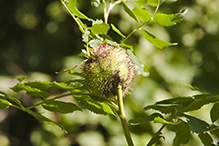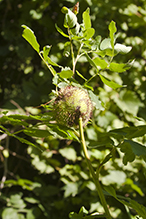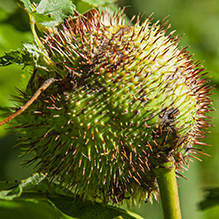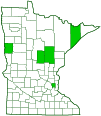spiny rose stem gall wasp
(Diplolepis spinosa)
Conservation • Description • Habitat • Ecology • Distribution • Taxonomy
Conservation Status |
|||
| IUCN Red List | not listed |
||
| NatureServe | not listed |
||
| Minnesota | not listed |
||
Description |
Spiny rose stem gall wasp is a cynipid gall wasp. It is usually identified by the gall it produces. The gall is spherical or irregularly spherical and about ⅞″ in diameter, about the size of a golf ball. When found in prairies on Wood’s rose, they are weakly spined or have no spines at all. When found in woodlands on smooth rose they are densely covered with spines. When young they are green and the spines are soft. When mature they are reddish-brown or purple, hard, and woody. The gall is firmly attached to the plant and cannot be removed without snips. Adults are ⅛″ to ¼″ long. The males are black, the females are reddish-brown. The front segment (mesosoma) is short and strongly arched, giving a hunchback appearance. |
Size |
Gall: about ⅞″ in diameter Adult: ⅛″ to ¼″ long |
Similar Species |
Habitat |
In prairies on Wood’s rose and in woodlands on smooth rose |
Ecology |
Season |
One generation per year |
Behavior |
|
Life Cycle |
In the spring the female deposits up to 16 or more eggs in a leaf bud at the base of the apical meristem. The eggs hatch after 10 to 15 days and the larvae begin feeding on stem tissue. The plant responds by producing a thick layer of stem cells around the larvae. The gall is first noticeable when it is about twice as wide as the shoot. At this phase each larva is small and eats little. In mid-June the larva enters the maturation phase and grows rapidly, consuming all of the nutritive cells in its chamber. The gall reaches its maximum size in late June. In mid-August the larva stops eating and enters a pre-pupa stage. It overwinters in this stage. The gall is often above the level of the snow and the insect inside is subjected to extremes of temperature. It avoids freezing by producing and accumulating glycerol. In early spring the insect enters the white pupa stage. When the temperature reaches 54° the pupa darkens. In the spring or summer, when the buds of the host plant are growing, the adult chews an exit tunnel from its chamber and flies off in search of a mate. The adult lives just 5 to 12 days. |
Larva Hosts |
Smooth rose (Rosa blanda var. blanda), Wood’s rose (Rosa woodsii var. woodsii), and rugose rose (Rosa rugosa) cultivars. |
Adult Food |
Adults do not feed. |
Distribution |
||
|
Sources |
|
| 8/28/2025 | ||
Occurrence |
||
Common |
||
Taxonomy |
|
Order |
Hymenoptera (Ants, Bees, Wasps, and Sawflies) |
Suborder |
Apocrita (narrow-waisted wasps, ants, and bees) |
Infraorder |
Proctotrupomorpha |
Superfamily |
Cynipoidea (gall wasps and allies) |
Family |
Diplolepididae |
Subfamily |
Diplolepidinae (rose gall wasps) |
Tribe |
Diplolepidini |
Genus |
Diplolepis |
Subordinate Taxa |
|
|
|
Synonyms |
|
Diplolepis multispinosus Rhodites multispinosus |
|
Common Names |
|
spiny rose stem gall wasp |
|
Glossary
Apical meristem
Embryonic tissue at the tip of a root or the bud of a stem where cell division occurs causing growth in length.
Mesosoma
In Hymenoptera: the front part of the body, consisting of all three segments of the thorax and the first segment of the abdomen, to which the wings are attached.
Visitor Photos |
Share your photo of this insect. |
||
This button not working for you? |
||
|
||
MinnesotaSeasons.com Photos |
 |
 |
|
 |
 |

Slideshows |
|

Visitor Videos |
Share your video of this insect. |
||
This button not working for you? |
||
|
Other Videos |
|

Visitor Sightings |
Report a sighting of this insect. |
||
This button not working for you? |
||
Nancy |
Location: New Prague, MN I just cut down a rose bush full of the gall balls |
Raevensong |
Location: Pennington County, MN |
MinnesotaSeasons.com Sightings |

|
Created: 9/13/2019 Last Updated: © MinnesotaSeasons.com. All rights reserved. |
